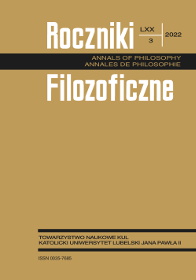„Rzeczy pospolite”: stare i nowe pojęcia powszechnika
“Common Things”: The Old and the New Concepts of Universals
Author(s): Paweł RojekSubject(s): Philosophy, Philosophical Traditions, Ontology
Published by: Towarzystwo Naukowe KUL & Katolicki Uniwersytet Lubelski Jana Pawła II
Keywords: universals; realism; nominalism; trope theory; scholasticism; patristics; Trinity
Summary/Abstract: Analytic philosophers usually believe that the problem of universals they discuss is the same problem that was discussed in antiquity and the Middle Ages. However, historians of philosophy point out that the old dispute on universals involved many different issues and did not focus on the currently debated problem of common properties. In my book Tropy i uniwersalia [Tropes and Universals], I assumed that the concept of universals had more or less the same meaning and I interpreted St. Thomas Aquinas’ position as a kind of contemporary realism. My interpretation raised interesting polemics by historians of philosophy, Tomasz Tiuryn and Michał Głowala. In this paper I attempt to examine the similarities and differences between contemporary and medieval understandings of universals and to answer some of their objections. It seems that there were at least three different notions of universals in the Middle Ages. First, they were understood as common beings, strictly identical in many realizations. This concept of universals is perhaps due to the patristic discussions of the Trinity in the fourth century. Second, universals were defined as entities predicated of the many, that is, as general concepts existing in the intellect. Third, and finally, they were thought, especially in late scholasticism, as entities divided into their realizations. Only the first concept agrees with the contemporary understanding of universals. It follows that the medieval and contemporary dispute over universals partially overlap. Finally, I also try to show that the interpretations of Aquinas’s position proposed by Tomasz Tiuryn and Michał Głowala lead in fact to a peculiar position that combines trope theory and Quine’s ostrich nominalism.
Journal: Roczniki Filozoficzne
- Issue Year: 70/2022
- Issue No: 3
- Page Range: 367-399
- Page Count: 33
- Language: Polish

